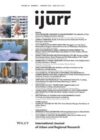As urbanization takes on forms and spaces beyond the typical city, urban theorists have questioned how the field can comprehend the rural. Drawing on recent theories in rural geography, I propose the concept of ‘state-led ruralization’, which I define as state agencies’ deliberate effort to reshape rural social space by regulating the relations between rural people and their land, the physical forms of the rural environment and the subjectivity of rural dwellers. I argue that state-led ruralization and extended urbanization, although deeply entangled, are two distinct categories of planetary capitalism. I examine their entanglement through an ethnographic analysis of a case of state-led ruralization: agrarian corporatization in Sangshan, a village in rural Hunan province, China. Following national efforts to maximize food yields to feed urban populations—a mode of land governance that I call the ‘food security regime’—Sangshan village government sought to persuade farmers to sign a deal to transfer their land to an agribusiness corporation. My findings reveal that farmers’ ability to opt out of these deals and retain their farmlands largely depended on the economic power they had previously accumulated in cities through urbanization. These relations between urbanization and ruralization may offer alternative pathways for urban theorization.
Details
Written by:
Ettore Santi
Digital Object Identifier (DOI)
https://doi.org/10.1111/1468-2427.70008
About DOI
